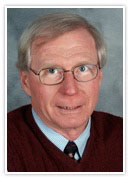I.
We have revelation from God which is clear, authoritative, powerful, and sufficient. Our religion is a revealed religion. We are not simply dependent on reason and the senses to draw logical conclusions about questions pertaining to our relationship with God and build on them. Rather the opposite, as we sing in one of our hymns: "All our knowledge, sense, and sight, lie in deepest darkness shrouded," when it comes to spiritual matters. Reason, human will power, and mystical experience do not yield truth about God which can save us eternally.
II.
The profound nature of our alienation from God and hopelessness of our condition must simply be acknowledged on the basis of the Word. This is the work of the mirroring and smashing function of the Law which exposes and breaks down all human pretentions to love God and fellow man in such a way that we might have hope of redemption in ourselves.
Then come those core concepts of the Lutheran tradition, the workings of the Holy Trinity for our salvation. And you simply will not find this structure in place in the same way in any other system of religion/theology. This is the core of our heritage.
III.
God sent his son into the world in the miracle of the incarnation, not to condemn the world, but that the world might be saved on the basis of his perfect life, his sacrificial atonement for all sin, and his victory over death. Salvation has been won perfectly. It is finished. All of our theology connects here.
IV.
But the Son of God did not simply leave this finished salvation floating freely out there somewhere for us to find by our own devices. Our Gospel is not just about the availability or possibility of redemption. Christ instituted the Sacred Means of Grace, the Gospel in Word and Sacrament, to bring it to us wherever and whenever people live from the beginning of the world to the end. By these means he purposes to bring to us and powerfully give to us all the benefits of salvation: freedom from sin, Satan, the curse of the Law, and death. Christ has established the office of the Holy Ministry among the faithful to administer these things.
V.
At this crucial point we don't talk about decisions as to whether you want this salvation or not, or have it within your powers to get it, or the necessity of "doing your part." God bestows faith when and where it pleases him through the means appointed to give it. From beginning to end our salvation is his work.
VI.
We present the nature of the Christian life in its many facets in the realistic way in which Scripture presents it. A fascination with achieving immediate success and glory through our faith is not our heritage. That is the delusion of much contemporary religion and worship of God. We emphasize the saint and sinner nature of the Christian life down to the grave, the struggles of life under the cross, working humbly in our Christian vocations for the benefit of others and ourselves, the command and promise of God regarding prayer, and the joy of the Gospel in the midst of many sorrows in the knowledge that the Savior has overcome all.
VII.
And finally we have hope and live in anticipation of the resurrection. We know of a sleep in Jesus' name from which we will be awakened by the voice of God on the last day to find fullness of joy in the presence of God and the saints.
In our confessional heritage outlined above we have that which serves us in our spiritual need. I can attest to that in a very personal way at the present moment as two forms of cancer rage through my body to destroy it. The heritage based on the rock solid foundation of Sacred Scripture is summarized in our confessional writings, and enshrined in the historic liturgy of the Christian Church, and its treasure trove of hymns.
May the blessing of God rest upon BLC now and always.
Mark H
Used with permission of the Harstad family and the Bethany Lutheran College Religious Studies Division
Translate this page into your language
Return to original language with "show original" button at top left.

Discussion